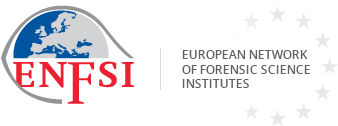Theme of MP2010 programme was “Strenghtening the Evaluation of Forensic Results across Europe” (STEOFRAE). The EC allocated € 600.000 for ENFSI to spend on 7 projects listed below.
The overall project MP2010 took place over 36 months and involved 15 participating organisations (mainly European forensic institutes). Furthermore, the project aimed to work closely with other organisations: ILAC (International Laboratory Accreditation Cooperation), EA (European Cooperation for Accreditation), National Accreditation Bodies, Eurachem, judges, prosecutors, lawyers and police officers.
Project Code: M1
Title: The development and implementation of an ENFSI standard for reporting evaluative forensic evidence.
Allocated Budget: €247,172.00
Project Leader: Sheila Willis (EFE, Dublin – Ireland)
This project aimed on standardised and improved interpretation in ENFSI laboratories. There is little doubt that the interpretation of forensic findings, including its proper communication (either orally or in written form), constitutes one of the main challenges for forensic science. There are many references to this need in various official communications for example the recent ESRIF report of 2009. The implementation of good practice for interpreting and reporting of forensic evidence is difficult. At the time of the project the situation in ENFSI forensic laboratories was very diverse.
The resulting guideline can be found here
Project Code: M2
Title: The development of a knowledge examination for competence assessment.
Allocated Budget: €118,577.70
Project Leader: Didier Meuwly (NFI, The Hague – The Netherlands)
This project developed an internet based competence assessment process with a knowledge examination for theoretical forensic science knowledge – demonstrating an assessment of general forensic knowledge for ENFSI members. General forensic knowledge included the aspects of forensic science that all those that report scientific evidence should be aware of, regardless of their area of expertise.
Project Code: M3
Title: Updating the ENFSI STR BASE
Allocated Budget: €20,100.00
Project Leader: Ingo Bastisch (BKA, Wiesbaden – Germany)
This project addressed the update of the software and query engine of the internet database. Recent developments in forensic molecular biology led to the expansion of investigated STR loci that needed to be implemented in the ENFSI STR BASE in order to maintain usability for forensic casework. This was achieved by the EU funded project carried out by the ENFSI DNA Expert Working Group (JLS/2007/ISEC/506). The main project goal was the adaptation of the ENFSI STR BASE to the modern requirements in forensic molecular biology and to the new demands for European DNA data exchange (Council Resolution of 30 November 2009 on the exchange of DNA analysis results; 2009/C 296/01).
Project Code: M4
Title: An international training seminar on the use of sub class characteristics in firearm investigations.
Allocated Budget: €25,904.00
Project Leader: Ruprecht Nennstiel (BKA, Wiesbaden – Germany)
Within the project, foreign firearms expert were invited to give a course (seminar) on sub-class characteristics in Europe. Fifty European firearm experts coming from ENFSI laboratories attend this seminar. The seminar ensured that European firearm examiners are fully aware of this challenge. Practical examples helped examiners to notice sub-class characteristics during their own casework. This would help to avoid errors, prevent misidentifications and contribute to better quality in the European jurisdictional system.
Project Code: M5
Title: Workshops on the application of the Bayesian approach in gunshot residue investigation.
Allocated Budget: €37,124.00
Project Leader: Ludwig Niewoehner (BKA, Wiesbaden – Germany)
This project involved a 2 days training workshop for experts from the University of Lausanne and/or the University of Strathclyde. This provided a sound theoretical basis to approximately 20 GSR experts from across Europe. It facilitated a deep assessment of the method as it can be applied to routine GSR casework. Additionally, a second workshop was offered to provide an opportunity for the participants to provide feedback on the impact experienced with real casework.
The goal of the project was to engender transparency for scientific assessment, a high standard in forensic investigation and harmonization of forensic investigative methods for firearms crime throughout Europe.
The resulting final report can be found here.
Project Code: M6
Title: Guidelines for the representative sampling of drugs for quantitative analysis.
Allocated Budget: €29,770.50
Project Leader: Laurence Dujourdy (INPS, Ecully – France)
This project went a long way, focusing on the heterogeneity of the most common controlled drugs across Europe, thereby giving forensic scientists greater confidence in their reported results, allowing them to interpret them more fully and add to their evidential value. The aim of the project was to produce guidelines for the representative sampling of drugs for quantitative analysis.
Project Code: M7
Title: The evaluation of computer proficiency tests within computer forensics.
Allocated Budget: €62,966.00
Project Leader: Hakan Bergstedt (SKL, Linkoping – Sweden)
Proficiency tests are important tools in forensic science to guarantee the quality standards at a forensic laboratory and to demonstrate comparability of forensic examinations between different European laboratories. They are also necessary for the accreditation of methods.
